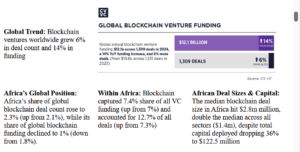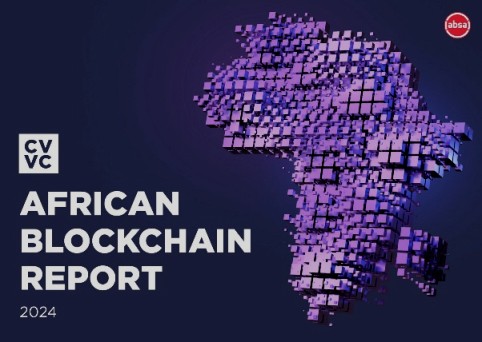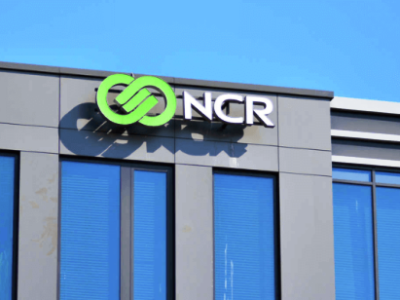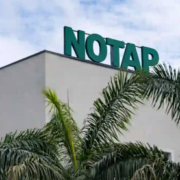CV VC’s fourth African Blockchain Report delivers a resounding message: The world needs to catch up to Africa.
RELATED: Blockfuse labs launches new cohort to train blockchain developers
While blockchain accounts for 3.2% of total VC funding globally, it commands a much stronger 7.4% share in Africa, more than double, underscoring the continent’s strategic embrace of the technology and its alignment with local needs. Africa also led all regions in blockchain deal growth, with a 15% year-on-year increase. This reflects strong early-stage momentum, founder resilience, and rising investor confidence despite capital constraints.
“Blockchain technology is uniquely suited to solving niche African problems,” said Jarryd Kennedy, Head of Investments at CV VC Africa.
“African founders are showing the world how blockchain addresses real-world challenges like data sovereignty, efficient remittances, provable identity, inaccessible credit, and verifiable land ownership. As more success stories surface, investor confidence continues to rise.”
Key Report Findings

Key Report Findings, continued:
Leading Markets: Nigeria leads with 33% deal count, Kenya secures 13% of Africa’s blockchain deals. South Africa captures 18% of the total funding, while Pan-African startups attract 28.4% of all funding, reflecting the rise of scalable, cross-border platforms.
Stage Focus: Seed rounds dominated, attracting 33.9% of all blockchain funding, showing strong early-stage momentum.
Sector Focus: Centralized Blockchain Financial Services received the largest share of funding, accounting for 40.5% of total funding.
Beyond Fintech: Blockchain Is Empowering Africa’s Critical Industries
“Africa isn’t testing blockchain, it’s embedding it where it matters most for the future of humanity. “In agriculture, we’re blending regenerative wisdom with blockchain transparency,” said George Maina, CEO of Shamba Records.
The CV VC African Blockchain Report reveals a shift: blockchain in Africa is no longer only confined to digital assets and finance. It is now a vital technology layer for the advancement of other essential sectors, such as agriculture, which employs over 60% of Africa’s workforce. Here, blockchain is securing land ownership, powering rural energy, and verifying farmers’ climate action, but its most immediate impact is in transforming Africa’s food supply system.
Blockchain is solving the continent’s double-digit billion food export loss caused by poor supply chain traceability. By recording farmer identities and crop data history onchain, it helps meet strict new EU import rules, such as the €7.5 billion demand for proof of zero deforestation and ethical sourcing by 2025.
Blockchain brings transparency, liquidity, and global market access to farmers with just a mobile connection. Farmers are rewarded for climate-positive action, using blockchain-verified carbon tracking, which can earn a smallholder an extra $300 per year, enough to send two children to school. With global food brands chasing ESG targets, Africa is poised to tap into the billion-dollar green food market.
Regulatory Awakening and the Opportunity Gap
Seven African nations now have clear digital asset regulations. Another 35 are exploring frameworks, shifting from risk aversion to innovation enablement. Yet Africa still captured just 1% of global blockchain funding in 2024.
“This isn’t just an investment gap, it’s an opportunity gap. Africa isn’t underperforming. Global capital is under-participating,” said Mathias Ruch, CEO, CV VC.
Africa will be home to 25% of the world’s population by 2050, it has 65% of global arable land, and 9 of the world’s 20 fastest-growing economies. With the leapfrogging infrastructure of mobile and blockchain, African blockchain founders are not following. They are forging.
“This report highlights a continent in motion. African innovators are solving deeply rooted challenges with blockchain, from trade bottlenecks to agricultural transformation. Absa is pleased to be an active contributor and believes blockchain will be central to Africa’s digital economic leap,” said Rob Downes, Head of Digital Assets, Absa CIB.
The CV VC African Blockchain Report, published in association with Absa Group, doesn’t just present data. It signals transformative economic innovators to global investors, developers, and policymakers.
Nigeria’s National Blockchain Policy Unlocks New Digital Innovations
The Federal Government of Nigeria formally approved the National Blockchain Policy in May 2023, marking a bold step toward building a blockchain-powered digital economy. The policy is designed to promote secure transactions, transparent data sharing, and efficient value exchange across public and private sectors, while driving economic transformation through blockchain innovation.
At its core, the policy aims to foster blockchain adoption in key sectors such as financial services, supply chain management, digital identity systems, and public service delivery. It also lays the groundwork for a robust legal and regulatory framework to ensure safe and scalable blockchain deployment nationwide.
Driving Talent and Innovation
A major pillar of Nigeria’s blockchain strategy is capacity building and talent development. The policy prioritizes training programs, academic research, and certification initiatives to develop a skilled blockchain workforce equipped to harness emerging technologies for national development.
“Blockchain is not just a technology—it’s a catalyst for innovation, transparency, and economic inclusion,” said a senior official involved in the policy rollout.
Why Nigeria is Poised for Blockchain Growth
With over 60% of its population under the age of 25, Nigeria boasts the youngest demographic in Africa. This digitally savvy generation, coupled with widespread smartphone adoption, has created fertile ground for rapid blockchain uptake and innovation.
Communities across the country are already witnessing a blockchain revolution. Companies such as Blockfuse, a Jos-based blockchain development firm, are nurturing a new wave of developers and entrepreneurs who are pioneering real-world applications of blockchain—from smart contracts to decentralized finance (DeFi) and digital identity systems.
Key Objectives of Nigeria’s National Blockchain Policy:
- Enable secure and transparent digital transactions across sectors
- Promote financial inclusion through blockchain-based identity and payment systems
- Enhance accountability and operational efficiency in public institutions
- Support startups and developers through a favorable regulatory environment
- Drive economic diversification and job creation through blockchain-enabled services
The policy aligns with Nigeria’s broader digital economy agenda and the National Digital Economy Policy and Strategy (2020–2030). It reflects a vision where blockchain plays a pivotal role in boosting trust, reducing corruption, and fostering inclusive innovation.
Nigeria has become a regional hub for blockchain talent and solutions, reinforcing its leadership in Africa’s emerging digital economy.
Additional reports by By Osasómé C.O






























